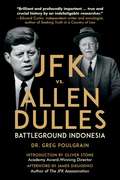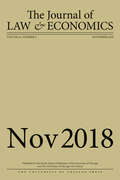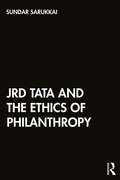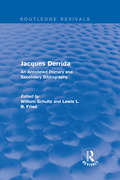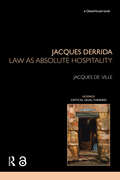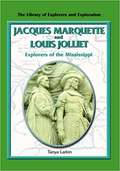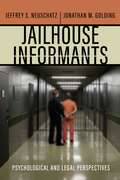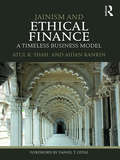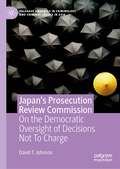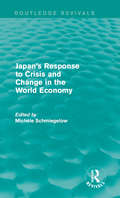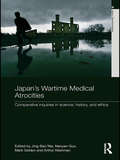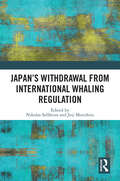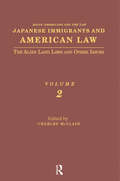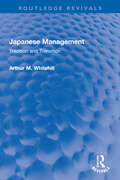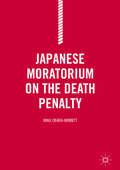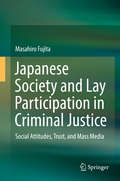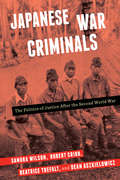- Table View
- List View
JFK vs. Allen Dulles: Battleground Indonesia
by Greg PoulgrainFor fans of conspiracy theories and JFK assassination theories, the untold story of Indonesia, gold, JFK, Allen Dulles, the CIA, and secret military coups. Two of the most fascinating figures in history, John F. Kennedy, thirty-fifth president of the United States, and Allen Dulles, our nation&’s longest-serving CIA director, often clashed over intelligence issues and national security. However, one such conflict has remained in the shadows until now. JFK vs. Allen Dulles: Battleground Indonesia takes reader to the vast archipelago 3350 miles wide where this secret showdown occurred. In 1936, an Allen Dulles-established company discovered the world's largest gold deposit in remote Netherlands New Guinea. In 1962, President Kennedy intervened, and Netherlands New Guinea was added to President Sukarno's Indonesia. Neither Sukarno nor JFK was aware of the gold, since Dulles had not informed Kennedy. Dulles planned a complicated and ruthless CIA regime-change strategy to seize control not only of Indonesia itself, but also of its vast resources, including the gold. This strategy included a push to start Malaysian Confrontation. Yet Kennedy's plan to visit Jakarta in early 1964 would have sunk Dulles' master plan, which included the destruction of the Indonesian communist party as a wedge to split Moscow and Beijing. Only an assassin's bullet put an end to Kennedy&’s plan of peace. Did Allen Dulles arrange for JFK to be killed to save his plan and his gold? Was his coup for gold successful with JFK out of the picture? Using archival records as a basis, Greg Poulgrain adds word-of-mouth evidence from those people who were directly involved—such as Dean Rusk and others who worked with President Kennedy and Allen Dulles at the time; or the person who was with Michael Rockefeller when he mysteriously disappeared in West New Guinea during this whole affair.
JLE vol 61 num 4
by The University of Chicago PressThis is volume 61 issue 4 of The Journal of Law and Economics. Established in 1958, the Journal of Law and Economics publishes research on a broad range of topics, including the economic analysis of law, the economic analysis of regulation and the behavior of regulated firms, industrial organization and antitrust policy, the political economy of legislation and legislative processes, law and finance, and corporate finance and governance. The JLE has published some of the most influential and widely cited articles in these areas. It is an invaluable resource for academics and those interested in cutting-edge analysis of current public policy issues.
JRD Tata and the Ethics of Philanthropy
by Sundar SarukkaiThis book introduces readers to the ethics of philanthropy, particularly in the Indian context. Drawing on JRD Tata’s philosophy and approach to business, it shows how business and philanthropy were intrinsically related for him. JRD Tata was arguably one of the most influential businessmen in post-Independence India. He was instrumental in not only expanding the Tata businesses but was also known for his impact on the conduct of business as well as his support for various national projects including research and education. He introduced key labour laws in his factories, which later became the model for the Indian government. He was also part of government institutions such as Air India. By discussing ideas such as trusteeship, the notion of profit, the relation between public and private, and social welfare, the book offers an intellectual map of JRD’s thoughts and an original perspective on their significance for an ethics of philanthropy in general. It provides new insights into the nature of ethical problems in the Indian context as well as ways to negotiate with them based on JRD’s work and reflections. It further creates a more meaningful understanding of Corporate Social Responsibility in the present global economy. Lucid and comprehensive, this book will be useful to scholars, researchers and faculty in departments of management and business studies, social work, sociology, economics and philosophy, as well as across social sciences. It will be of great interest to philanthropy organisations, non-governmental organisations, business schools, industry bodies, corporates, and those in leadership and management.
Jack the Ripper
by Victor StapletonIt has been over one hundred years since Jack the Ripper spread death and terror through the streets of Whitechapel, but time has done little to unwrap the mystery behind the murders. If anything, the story of Jack is now more confusing, obscure, and mysterious than ever. With every passing generation, new theories and new suspects have sprung up, each adding another piece to the legend. Within these pages, Victor Stapleton examines the entire legend of Jack the Ripper. He opens with an explanation of the original murders, the investigation that followed, and the various copycat killings and scares that occurred in the direct aftermath. He then explores the cases of all of the primary suspects, both those that were part of the original police investigation, and those that have been named by later writers and theorists. From there, Stapleton maps the transition of Jack from a historical figure into a character of folklore, literature, and cinema.This is the true history of Jack the Ripper.
Jacques Derrida (Routledge Revivals): An Annotated Primary and Secondary Bibliography
by William R. Schultz Lewis L.B. FriedFirst published in 1992, this book represents the first major attempt to compile a bibliography of Derrida’s work and scholarship about his work. It attempts to be comprehensive rather than selective, listing primary and secondary works from the year of Derrida’s Master’s thesis in 1954 up until 1991, and is extensively annotated. It arranges under article type a huge number of works from scholars across numerous fields — reflecting the interdisciplinary and controversial nature of Deconstruction. The substantial introduction and annotations also make this bibliography, in part, a critical guide and as such will make a highly useful reference tool for those studying his philosophy.
Jacques Derrida on the Aporias of Hospitality
by Gerasimos KakolirisThe book systematically presents Derrida’s views on hospitality, as reflected in his texts and lectures from 1995 until his death in October 2004. Derrida’s engagement with hospitality is perhaps the most important and extensive philosophical attempt to respond critically to the growing hostility of many governments worldwide towards specific categories of foreigners, such as refugees and immigrants. Particular emphasis is placed on the ‘aporetic’ nature of hospitality that Derrida describes: namely, that, on the one hand, the provision of hospitality brings us face to face with the hyper-ethical ‘law’ of ‘unconditional hospitality,’ which requires the unconditional reception of the other, i.e. the provision of hospitality to the foreigner without conditions, restrictions or expecting anything in return. On the other hand, the provision of hospitality forces us to face the ‘conditional’ laws of hospitality, which, while establishing a right to and a duty of hospitality, simultaneously restrict hospitality by setting conditions for the arrival and stay of the foreigner. The book also analyses the ‘decision’ and the ‘event’ of hospitality, as well as the unresolved ‘aporia’ at the heart of the ethics of hospitality (or of ethics in general), an aporia or contradiction related to the fact that we cannot be hospitable towards a singularity without ‘sacrificing’ some other singularities. Attention is paid to Derrida’s attempt to open the provision of hospitality beyond humans, that is, to other living beings. Derrida’s views on hospitality are examined in the book in the light of the philosophical thought of Emmanuel Levinas, Immanuel Kant and René Schérer.
Jacques Derrida: Law as Absolute Hospitality (Nomikoi: Critical Legal Thinkers)
by Jacques de VilleJacques Derrida: Law as Absolute Hospitality presents a comprehensive account and understanding of Derrida’s approach to law and justice. Through a detailed reading of Derrida’s texts, Jacques de Ville contends that it is only by way of Derrida's deconstruction of the metaphysics of presence, and specifically in relation to the texts of Husserl, Levinas, Freud and Heidegger - that the reasoning behind his elusive works on law and justice can be grasped. Through detailed readings of texts such as To speculate – on Freud, Adieu, Declarations of Independence, Before the Law, Cogito and the history of madness, Given Time, Force of Law and Specters of Marx, De Ville contends that there is a continuity in Derrida’s thinking, and rejects the idea of an ‘ethical turn’. Derrida is shown to be neither a postmodernist nor a political liberal, but a radical revolutionary. De Ville also controversially contends that justice in Derrida’s thinking must be radically distinguished from Levinas’s reflections on ‘the other’. It is the notion of absolute hospitality - which Derrida derives from Levinas, but radically transforms - that provides the basis of this argument. Justice must on De Ville’s reading be understood in terms of a demand of absolute hospitality which is imposed on both the individual and the collective subject. A much needed account of Derrida's influential approach to law, Jacques Derrida: Law as Absolute Hospitality will be an invaluable resource for those with an interest in legal theory, and for those with an interest in the ethics and politics of deconstruction.
Jacques Marquette and Louis Jolliet: Explorers of the Mississippi (Library of Explorers and Exploration)
by Tanya LarkinA biography of the French explorers whose primary goal was to find the Northwest Passage, but who made their mark on history by exploring and charting the Mississippi River.
Jailhouse Informants: Psychological and Legal Perspectives (Psychology and Crime)
by Jeffrey S Neuschatz Jonathan M GoldingOffers a new understanding of jailhouse informants and the role they play in wrongful convictions Jailhouse informants—witnesses who testify in a criminal trial, often in exchange for some incentive—are particularly persuasive to jurors. A jailhouse informant usually claims to have heard the defendant confess to a crime while they were incarcerated together. Research shows that such testimony increases the likelihood of a guilty verdict. But it is also a leading contributor to wrongful convictions. Informants, after all, are generally criminals who are offering testimony in return for some key motivator, such as a reduced sentence. This book offers a broad overview of the history and legal and psychological issues surrounding the testimony of jailhouse informants. It provides groundbreaking psychological research to address how they are used, the number of convictions that have ultimately been overturned on other evidence, how such informants are perceived in the courtroom, and by what means jurors might be informed about the risks of this type of testimony. The volume provides a much-needed examination of legal remedies to the impact of jailhouse informants and suggests best practices in dealing with jailhouse informant testimony in court. There is a critical need to understand the influence of jailhouse informants and how their testimony can best be handled in court in the interests of justice. Jailhouse Informants is the first work of its kind that rises to the challenge of answering these difficult questions.
Jainism and Ethical Finance: A Timeless Business Model
by Atul K. Shah Aidan RankinThe financial crisis of 2008 has led to a re-evaluation of the role of financial institutions and their relationship with the wider economy and society. This process has meant an increased questioning of both the conduct of business itself and the principles behind commercial and financial activities. Yet non-western voices have been notably absent from this debate, as have alternatives to the dominant western-derived economic ideologies. From the ancient spiritual wisdom or Dharma of the Jains, there emerges a practical modern philosophy fully in tune with the re-emergence of India as a global economic power. Jain individuals, businesses and charities have played a powerful role in India’s rise and within the global Indian Diaspora. Jain communities are noted everywhere for their contributions to business, the professions and science. These successes are based on the principles of interdependence and co-operation, with an emphasis on long-term consolidation rather than short-term bursts of growth. Researchers and students interested in the ethics of finance, accounting and economics will find Jainism and Ethical Finance a scholarly and illuminating evaluation of Jain Dharma as a non-western case study. In the light of current concerns about the way global finance and banking systems operate, this book offers a timely alternative perspective. .
Jamás, nadie
by Beatriz Rivas"Yan vivió el resto de su existencia con el peso del sobreviviente. Un peso invisible pero despiadado." A lo largo de la historia y hoy en día, miles de migrantes huyen a diario de la miseria, de la violencia, de la guerra, de la hambruna, de la injusticia, arriesgando la vida en busca de una utopía, de una tierra donde empezar de nuevo y poder trabajar y vivir con dignidad# pero la realidad suele ser cruel e implacable. She Yan, el protagonista de esta novela, tiene apenas quince años cuando viaja de China hacia México en busca de una mejor vida, pues la sequía en Cantón empuja a su familia a dejar lo más querido para asegurar la sobrevivencia. Y así, en pleno año 1910, llega a Torreón, ciudad en el norte del país donde se esmera en el trabajo, sin queja y con devoción, hasta que la ignorancia, la envidia y el odio lo envuelven en un torbellino de sangre y muerte. Vital y cruda, amorosa y despiadada, esta novela inicia con una masacre y llega a territorios insospechados en los que Mía, la hija mexicana de Yan, descubrirá un camino hacia el reencuentro con un pasado doloroso y entrañable que la hará transformarse. Jamás, nadie podrá entender la intolerancia, el rechazo a lo distinto. El racismo, la xenofobia. El odio irracional ante lo extraño, lo "extranjero". La crítica ha dicho# "[Beatriz Rivas] nos muestra que cualquier indicio es suficiente para desdoblarnos en otros, para crear mundos cargados de complejidad, matizados siempre por un punto de vista humano, analítico, poético y erótico# Y ello sólo se consigue por medio de un oficio literario constante y bien empleado." Universidad de México "El impulso por escribir Todas mis vidas posibles, tercera novela de Beatriz Rivas, le vino luego de buscar su nombre en Google y encontrar un sinfín de vidas posibles, mientras el hilo conductor de la novela surge a raíz de una carta de William Coday, un convicto en Estados Unidos, quien se puso en contacto con la autora a propósito de La hora sin diosas, primer trabajo literario de la autora que impresionó al preso. Su novela es una exploración sobre la naturaleza humana, pero visto desde los personajes femeninos." El Clarín
Jan Patočka and the Phenomenology of Life After Death (Contributions to Phenomenology #128)
by Hugo Strandberg Gustav StrandbergThis volume contains for the first time in English, Jan Patočka’s seminal essay “The Phenomenology of Afterlife”, as well as contributions surrounding and analyzing this text. In his essay, Patočka reflects on our relation to the dead and on how the departure of a loved one affects our continued existence. The premise of Patočka’s investigation is that our existence always takes place by and through an originary and reciprocal “being for others”.The contributors in the volume extend the field of inquiry into the wider phenomenological and post-phenomenological discussion of death by being cognizant of how works of literature can broaden our understanding of the care of death, grief, forgiveness and non-reciprocal love. Also included are reflections on issues of philosophical anthropology, community, collective memory, and the ecstatic nature of life – issues that can all be related back to Patočka’s initial reflections, but which nonetheless radiate into a myriad of directions. This volume appeals to students and researchers in the field.
Jane's Baby
by Chris BauerWhatever happened to Jane Roe's baby? Norma McCorvey, of Caddo-Comanche heritage, did not terminate the pregnancy that led her to become the anonymous plaintiff of the landmark U.S. Supreme Court women's rights case Roe v Wade because in 1971, when the motion was first argued, abortion in the U.S. was illegal. The Jane Roe real-life child would now be a woman in her late forties, the potential of her polarizing celebrity unknown to her. A splintered U.S. religious rights group has blackmailed its way into learning the identity of the Roe baby, the product of a closed adoption. To what end, only a new Supreme Court case will reveal. Tourette's afflicted K9 bounty hunter Judge Drury, a retired Marine, stands in the way of the splintered group's attempt at stacking the Supreme Court via blackmail, murder, arson, sleight of hand, and secret identities.
Janet Reno: A Life
by Judith Hicks StiehmThe long-awaited biography of the first woman to serve as United States attorney general, written with exclusive access to the personal archives of Reno and her family and based on over 40 interviews with Reno’s friends and colleagues In this first full biography of former United States attorney general Janet Reno (1938–2016), Judith Hicks Stiehm describes the independent and unconventional life of a woman who grew up on a rural South Florida homestead and rose to occupy one of the top positions in the United States government, whose ethics and example served as inspiration for women in law and politics across the nation. In telling Janet Reno’s story, Stiehm incorporates personal details from her full and exclusive access to family papers and photos, as well as inside information from Reno’s own materials and interviews with over 40 of Reno’s personal and professional acquaintances. Stiehm begins by tracing Reno’s free-range childhood, her college years at Cornell and experience at Harvard Law School as one of 16 women in a class of over 500, the challenges she faced as a woman lawyer launching her career in 1960s Miami, and her 15 years as Miami-Dade state attorney. In 1993, Reno was appointed to serve in Washington as United States attorney general in the Clinton administration, the first woman to occupy the position in the history of the nation. Stiehm tells how Reno engaged with the East Coast elite as an outsider, seen by many as outspoken and eccentric—yet scrupulous, uncompromising, and immune to influence. Stiehm explores the reasons behind Reno’s decisions in cases she handled during her tenure, including the siege of the Branch Davidians in Waco, Texas; Kenneth Starr’s Whitewater investigation; the Oklahoma City bombing; and the Elián González controversy. Janet Reno’s life was an illustration to many that it is possible to hold high office while consistently speaking and acting on principle. This biography examines the guiding forces that shaped Reno’s character, the trails blazed by Reno in her professional roles, and the lasting influence of Reno on American politics and society to this day.
Japan's International Fisheries Policy: Law, Diplomacy and Politics Governing Resource Security (Nissan Institute/Routledge Japanese Studies)
by Roger D. SmithFew nations rely upon the ocean as much as Japan for livelihood, culture and transport. The seas have long played a vital role for the Japanese, helping to support the economic and social life of a nation that possesses few resources and little arable land, and sustain a population that has nearly tripled in the last century. Fish are a distinctive feature of the Japanese diet, constituting nearly half of all animal protein consumed – the highest rate in the world. The industry itself has provided an impetus for coastal community growth and national economic development over the past century, while fisheries have worked their way into Japanese culture and customs, serving as a dominant symbol in traditional arts and folklore. This book explores the overarching rationale that motivated Japanese international fisheries policy throughout the post-war period until today, highlighting the importance of international fisheries to Japan and the stature this resource has occupied as a national interest. It provides a comparative view of Japanese foreign policy at various ocean conferences, treaty negotiations, bilateral diplomatic initiatives and other maritime relations that constitute ocean policy over half a century, and investigates the domestic constituents of national policy. Roger Smith argues that the rationale for international fisheries policy may be best viewed as deriving from Japan’s unique defence strategy for its national interests: comprehensive security. Encompassing non-military elements and most importantly defence of economic interests, Japan’s international fisheries policy provides an interesting case study of how comprehensive security is conceptualised and carried out. Taking a broad view of Japan’s international fisheries policies from 1945 to the present, this book highlights the key trends in policy motives and means throughout the post-war period. As such, it will be of great interest to students and scholars of Japanese studies, international and environmental law, resource management and international relations, as well as to policy makers working in the field.
Japan's Prosecution Review Commission: On the Democratic Oversight of Decisions Not To Charge (Palgrave Advances in Criminology and Criminal Justice in Asia)
by David T. JohnsonThis book explains Japan’s unique Prosecution Review Commission (PRC) which is composed of eleven lay people selected randomly from voter registration lists. Each of the country’s 165 PRCs reviews non-charge decisions made by professional prosecutors and determines which cases should be reinvestigated or charged. PRCs also provide prosecutors with general proposals and recommendations for improving their policies and practices. The book analyzes the history and operations of the PRC and uses statistics and case studies to examine its various impacts, from legitimation and shadow effects to kickbacks and mandatory prosecution. More broadly, this book explores a problem that is common in many criminal justice systems: how to hold prosecutors accountable for their non-charge decisions. It discusses the potential these panels have for improving the quality of criminal justice in Japan and other countries, and it will appeal to scholars and students studying prosecution and democracy, criminal justice, criminology, lay participation, justice reform, and Japanese studies.
Japan's Response to Crisis and Change in the World Economy (Routledge Revivals)
by Michèle SchmiegelowOriginally published in 1986, after a period of global changes and financial crisis in the majority of industrialised countries, this book explores how Japan’s economy seemed to maintain its success. This study provides an overview of the Japanese case and the main schools of thought that arose from it by dealing with export-related issues such as reforms in foreign exchange and trade control laws and the internationalisation of Japan’s financial markets as well as more domestic issues such as employment and wages. This title will be of interest to students of Asian Studies and Economics.
Japan's Wartime Medical Atrocities: Comparative Inquiries in Science, History, and Ethics (Asia's Transformations)
by Jing-Bao NiePrior to and during the Second World War, the Japanese Army established programs of biological warfare throughout China and elsewhere. In these “factories of death,” including the now-infamous Unit 731, Japanese doctors and scientists conducted large numbers of vivisections and experiments on human beings, mostly Chinese nationals. However, as a result of complex historical factors including an American cover-up of the atrocities, Japanese denials, and inadequate responses from successive Chinese governments, justice has never been fully served. This volume brings together the contributions of a group of scholars from different countries and various academic disciplines. It examines Japan’s wartime medical atrocities and their postwar aftermath from a comparative perspective and inquires into perennial issues of historical memory, science, politics, society and ethics elicited by these rebarbative events. The volume’s central ethical claim is that the failure to bring justice to bear on the systematic abuse of medical research by Japanese military medical personnel more than six decades ago has had a profoundly retarding influence on the development and practice of medical and social ethics in all of East Asia. The book also includes an extensive annotated bibliography selected from relevant publications in Japanese, Chinese and English.
Japan's Withdrawal from International Whaling Regulation
by Nikolas Sellheim Joji MorishitaThis book examines the impact and implications of Japan's withdrawal from the International Convention for the Regulation of Whaling (ICRW), which came into effect in July 2019. In 1982 the International Whaling Commission (IWC) adopted a moratorium on commercial whaling which has been in effect ever since, despite the resistance of some countries, first and foremost Japan, Norway and Iceland, that engage in commercial whaling. As one of the key contributors to scientific research and funding, Japan's withdrawal has the potential to have wide-ranging implications and this volume examines the impact of Japan's withdrawal on the IWC itself, on the governance of whaling, and on indigenous and coastal whaling. It provides backgrounds and commentaries on this decision as well as normative and legal discussions on matters relating to sustainable use of resources, and philosophies surrounding whaling in different IWC countries. The consideration of other international environmental regimes, such as the Convention on International Trade in Endangered Species (CITES) are also examined in order to determine the international ripple effect of Japan’s decision. The book reveals that this is not just a matter of whaling but one which has significant legal, managerial and cultural implications. Drawing on deep analyses of IWC structures, the book addresses core philosophies underlying the whaling debate and in how far these may influence environmental governance in the future. This book will be of great interest to students and scholars of environmental law and governance, biodiversity conservation and sustainable development, as well as policymakers involved in international environmental and conservation agreements.
Japan's Withdrawal from International Whaling Regulation (Routledge Studies in Conservation and the Environment)
by Nikolas Sellheim Joji MorishitaThis book examines the impact and implications of Japan’s withdrawal from the International Convention for the Regulation of Whaling (ICRW), which came into effect in July 2019. In 1982 the International Whaling Commission (IWC) adopted a moratorium on commercial whaling which has been in effect ever since, despite the resistance of some countries, first and foremost Japan, Norway and Iceland, that engage in commercial whaling. As one of the key contributors to scientific research and funding, Japan’s withdrawal has the potential to have wide-ranging implications and this volume examines the impact of Japan’s withdrawal on the IWC itself, on the governance of whaling, and on indigenous and coastal whaling. It provides backgrounds and commentaries on this decision as well as normative and legal discussions on matters relating to sustainable use of resources, and philosophies surrounding whaling in different IWC countries. The consideration of other international environmental regimes, such as the Convention on International Trade in Endangered Species of Wild Fauna and Flora (CITES), is also examined in order to determine the international ripple effect of Japan’s decision. The book reveals that this is not just a matter of whaling but one which has significant legal, managerial and cultural implications. Drawing on deep analyses of IWC structures, the book addresses core philosophies underlying the whaling debate and in how far these may influence environmental governance in the future. This book will be of great interest to students and scholars of environmental law and governance, biodiversity conservation and sustainable development, as well as policymakers involved in international environmental and conservation agreements.
Japanese Immigrants and American Law: The Alien Land Laws and Other Issues (Asian Americans and the Law: Historical and Contemporary Perspectives #2)
by Charles McClainFirst Published in 1995. Since many Japanese immigrants focused on agriculture, California and other western states sought to discourage their presense by passing laws making it impossible for Japanese to own agricultural land and enacted other discriminatory as well. The articles in this volume explore the background and ramifications of the so-called Alien Land laws and other anti-Japanese measures and the fascinating legal challenges that ensued.
Japanese Management: Tradition and Transition (Routledge Revivals)
by Arthur M. WhitehillFirst published in 1991, Japanese Management succeeds in filling a major gap by providing a thorough account of the evolution and day-to-day practices of management within the Japanese firm. The 14 chapters not only build the historical framework and modern cultural, economic, and social setting, but also effectively deal with the process of management. The final two chapters address some future challenges facing Japanese firms as they operate in the global business environment. This comprehensive book is a must read for students of business management.
Japanese Moratorium on the Death Penalty
by Mika Obara-MinnittOffering a timely reanalysis of the issue of Japan's capital punishment policy, this cutting edge volume considers the de facto moratorium periods in Japan's death penalty system and proposes an alternative analytical framework to examine the policy. Addressing how the Ministry of Justice in Japan justified capital punishment policy during the de facto moratorium periods from 1989 to 1993, from 2009 to 2010 and from 2010 to 2012, the author debates the misconceptions surrounding the significance of these moratoriums. The book evidences the approach, rationale and evolution of Japan's Ministry of Justice in consistently justifying capital punishment policy during the different execution-free periods and provides a better understanding of the powerful unelected elite who actually drive the capital punishment system in Japan. Based on parliamentary proceedings, public opinion surveys and periodical reports by both international and domestic human rights NGOs as well as interviews of government ministers, NGO staff, pro- and anti-death-penalty advocates, this text is key reading for those interested in Japan, its government, criminal justice system and policies on the death penalty and human rights.
Japanese Society and Lay Participation in Criminal Justice: Social Attitudes, Trust, and Mass Media
by Masahiro FujitaThis book describes the state of the lay participation system in criminal justice, saiban-in seido, in Japanese society. Starting with descriptions of the outlines of lay participation in the Japanese criminal justice system, the book deals with the questions of what the lay participants think about the system after their participation, how the general public evaluate the system, whether the introduction of lay participation has promoted trust in the justice system in Japan, and the foci of Japanese society’s interest in the lay participation system. To answer these questions, the author utilizes data obtained from social surveys of actual participants and of the general public. The book also explores the results of quantitative text analyses of newspaper articles. With those data, the author describes how Japanese society evaluates the implementation of the system and discusses whether the system promotes democratic values in Japan.
Japanese War Criminals: The Politics of Justice After the Second World War
by Robert Cribb Sandra Wilson Beatrice Trefalt Dean AszkielowiczBeginning in late 1945, the United States, Britain, China, Australia, France, the Netherlands, and later the Philippines, the Soviet Union, and the People's Republic of China convened national courts to prosecute Japanese military personnel for war crimes. The defendants included ethnic Koreans and Taiwanese who had served with the armed forces as Japanese subjects. In Tokyo, the International Military Tribunal for the Far East tried Japanese leaders. While the fairness of these trials has been a focus for decades, Japanese War Criminals instead argues that the most important issues arose outside the courtroom. What was the legal basis for identifying and detaining subjects, determining who should be prosecuted, collecting evidence, and granting clemency after conviction? The answers to these questions helped set the norms for transitional justice in the postwar era and today contribute to strategies for addressing problematic areas of international law. Examining the complex moral, ethical, legal, and political issues surrounding the Allied prosecution project, from the first investigations during the war to the final release of prisoners in 1958, Japanese War Criminals shows how a simple effort to punish the guilty evolved into a multidimensional struggle that muddied the assignment of criminal responsibility for war crimes. Over time, indignation in Japan over Allied military actions, particularly the deployment of the atomic bombs, eclipsed anger over Japanese atrocities, and, among the Western powers, new Cold War imperatives took hold. This book makes a unique contribution to our understanding of the construction of the postwar international order in Asia and to our comprehension of the difficulties of implementing transitional justice.
